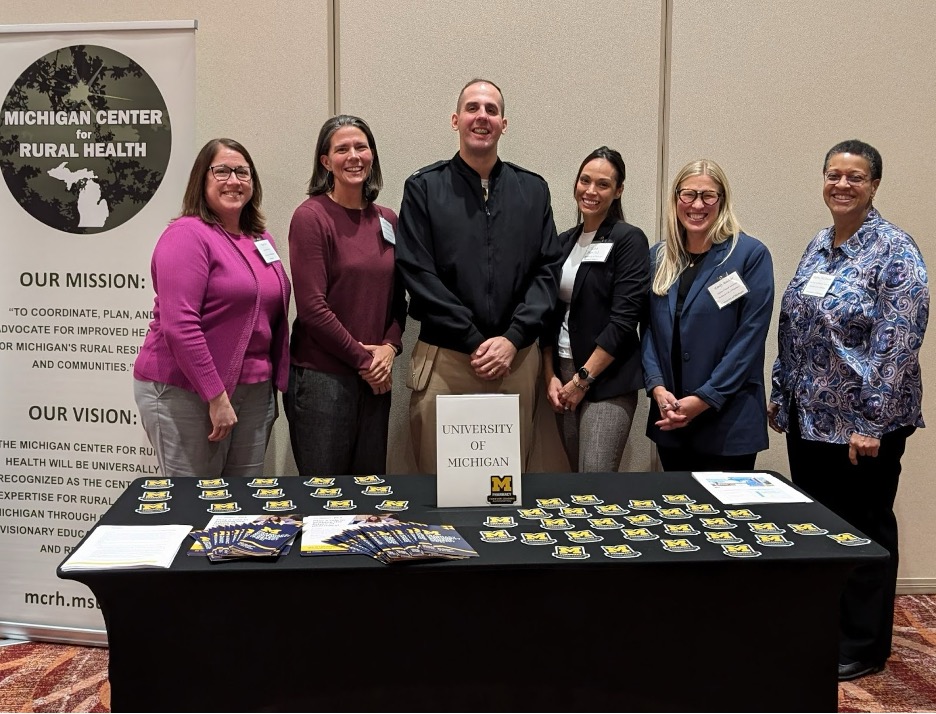University of Michigan College of Pharmacy- Collaborative for Indigenous Resources in Care, Learning, and Equity (UMCOP-CIRCLE)
In Michigan, 12 federally recognized tribes offer an array of health and wellness services through their tribal health clinics (THCs) that provide basic healthcare services, including primary and dental care, to both adults and children. For specialized medical needs, patients are generally referred to non-tribal facilities across the state. Nonetheless, American Indian/Alaska Native (AI/AN) populations in Michigan continue to face disproportionately high rates of serious health conditions, such as diabetes and liver disease. These health disparities result in some of the highest rates of morbidity and mortality among racial and ethnic groups in the state. Pharmacists have traditionally played a crucial role in clinical care within the Indian Health and Veterans Affairs Systems, serving as a cornerstone of innovative clinical care models. These models have demonstrated significant improvements in patient outcomes, including diabetes and hypertension control and increased viral hepatitis treatment rates. There is an opportunity to leverage these models and shared learnings within the THCs in Michigan.
The UMCOP Collaborative for Indigenous Resources in Care, Learning, and Equity has been created to partner with tribal communities and achieve the following specific aims.
1. Community Engagement and Partnership: Utilize community-engaged approaches to collaborate with THC leadership to expand the integration of clinical pharmacists into THC healthcare delivery across Michigan, building on the interest of several THC members.
2. Culturally Appropriate Implementation: Tailor the Michigan Institute for Care Management and Transformation (MICMT) program for embedding clinical pharmacist integration to be culturally appropriate and supportive of equitable healthcare delivery and medication use, considering the THC reimbursement model.
3. Impact Evaluation: Assess the impact of embedded clinical pharmacists in THCs on the quality of care, with a particular emphasis on addressing disparities in access to care, improving clinical outcomes, managing high-cost medications, and optimizing medication use.
4. Educational Enhancement: Establish THC clinical pharmacists as preceptors within the UMCOP, evaluate and enhance the educational outcomes and clinical effectiveness of student rotations, and expand learning and scholarship opportunities for AI/AN students.
Listing Row
- Core team members
Dr. Nicholas Cushman, Adjunct Clinical Assistant Professor
CDR Nicholas Cushman, PharmD, MHA, BCACP, is a commissioned officer with the U.S. Public Health Service and an enrolled member of the Sault Ste. Marie Tribe of Chippewa Indians. A leader in Indigenous healthcare, Dr. Cushman advances clinical services within the Indian Health system, currently serving as Clinical Program Coordinator for the Northwest Portland Area Indian Health Board’s Indian Country ECHO Program. He earned his PharmD from the University of Michigan and serves as adjunct faculty, advocating for improved healthcare outcomes for Indigenous communities.
Dr. Emily Mackler, Adjunct Clinical Associate Professor
Emily Mackler, PharmD, BCOP, is a clinical oncology pharmacist who began her career at the University of Michigan in 2002. With over two decades of experience, Dr. Mackler has made significant contributions to the field of oncology and to improving patient access to care. Most recently, she serves as director of POEM (Pharmacists Optimizing Oncology Excellence in MI), a groundbreaking program that provides funding/administrative support to integrate clinical pharmacists into community oncology practices throughout MI. In June 2023, she founded YesRx, a 501(c)(3) nonprofit service organization that increases access to essential cancer medications while decreasing waste. Her commitment to expanding access to care and health equity led her to the Inter-Tribal Council of Michigan and the Tribes within MI where she hopes to support the expansion of resources, clinical programming, and meaningful partnerships for Indigenous communities.
LinkedIn https://www.linkedin.com/in/emily-mackler/
ORCID iD 0000-0003-1258-1116
Dr. Toni Coe, Assistant Professor
Antoinette (Toni) B. Coe, PharmD, PhD, FAPhA is an Assistant Professor in the Department of Clinical Pharmacy at the University of Michigan College of Pharmacy. Dr. Coe is a pharmacist-health services researcher devoted to ensuring safe and effective medication use and improving transitions of care in older adults and underserved populations. Her research program is focused on understanding how healthcare delivery and health policy impact health and medication-related outcomes. Her work examines the effect of pharmacist’s care and medication management within innovative, interprofessional care models, community-based strategies to enhance care transitions, and policies that increase health equity and improve health and medication-related outcomes.
LinkenIn https://www.linkedin.com/in/antoinette-c-54671710/
ORCID iD 0000-0002-5723-0443
Dr. Amy Thompson, Clinical Professor and Director of Community Health and Engagement
Dr. Amy Thompson, PharmD, BCACP, is a Clinical Professor of Pharmacy and Director of Community Health and Engagement at the University of Michigan. She serves as the Director of Population Health Pharmacy and Community Partnerships within the University of Michigan Medical Group, where she oversees clinical pharmacy practice across both primary and specialty care settings. In addition to her leadership role, Dr. Thompson actively engages in patient care, managing chronic diseases in a patient-centered medical home clinic. Her professional focus is on developing clinical practices and advancing quality improvement initiatives to enhance patient outcomes. Dr. Thompson's research interests include the development of ambulatory care services, optimizing transitions of care, and expanding the role of pharmacists in enhancing patient outcomes.
LinkedIn: https://www.linkedin.com/in/amy-thompson-b99913208/
ORCID iD 0000-0003-2239-5368
- Recent events
Our team recently attended the Tribal Workforce Summit, an event hosted by the Michigan Department of Health and Human Services to bring together key organizations and potential partners throughout the state.
- Current opportunities
The College of Pharmacy is committed to supporting five clinical pharmacist positions over the next three years. This support will include funding and support for the clinical pharmacist for the first year of programming. Additionally, support includes administrative, clinical, and evaluation support, to ensure the pharmacist is able to fully integrate into practice at the clinical site. Ongoing support, outside of year one, will include quarterly tribal pharmacist meetings, clinical educational programming, and opportunities to engage learners in the service model.
Those interested in applying for an open Clinical Pharmacist position within the Tribal Health Community can upload their CV and letter of intent here: https://www.dropbox.com/request/5SD2uADWSoQrf4eG6TM5




